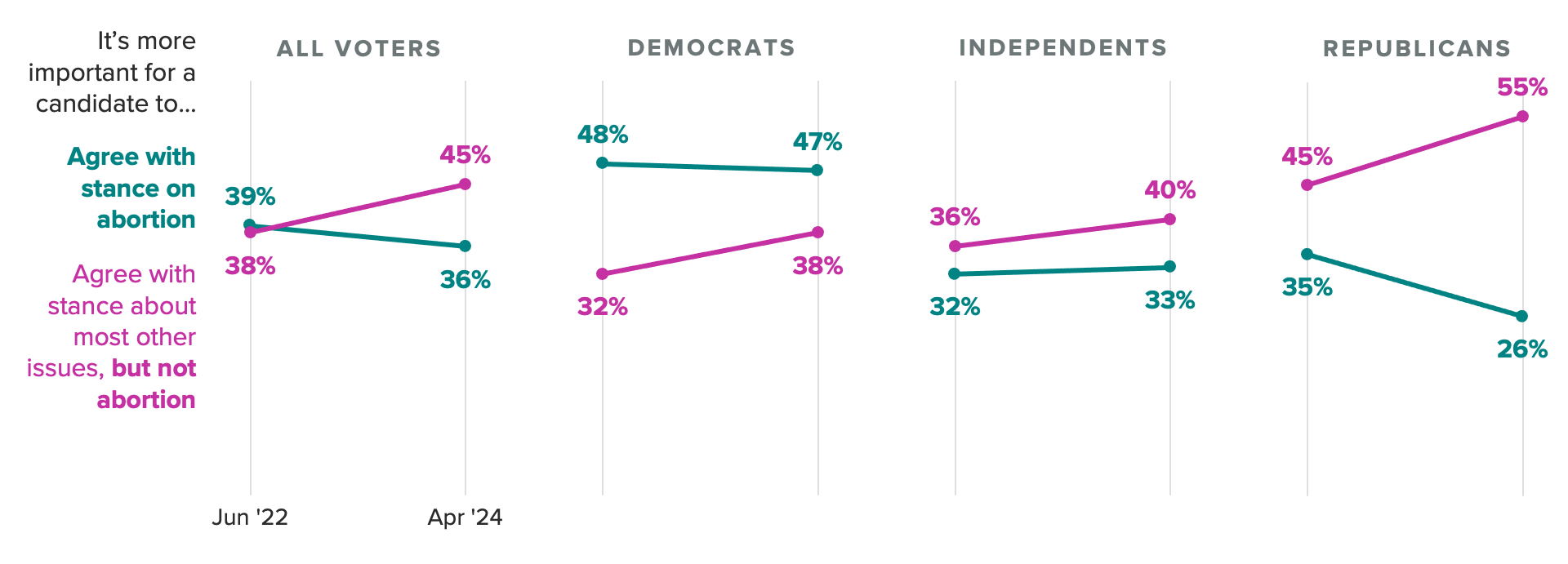A Candidate’s Abortion Stance May Matter Less in 2024 Than It Did in 2022

Data Downloads
Pro+ subscribers are able to download the datasets that underpin Morning Consult Pro's reports and analysis. Contact us to get access.
Sign up to get the latest data and analysis on how business, politics and economics intersect around the world.
More voters are expressing openness toward candidates disagreeing with their position on abortion now compared with the run-up to the 2022 midterm elections, according to a new Morning Consult survey conducted on behalf of POLITICO.
The latest data, conducted April 12-14, found that 45% of voters said it is more important for federal candidates to agree with their positions on most other issues even if they disagree about abortion access, up from 38% in a June 2022 survey. Over the same time period, the share of voters who said it is more important for them to agree with a candidate on abortion access than other issues declined slightly (from 39 to 36%).
Importance of a candidate's abortion stance has declined since 2022

Surveys conducted June 24-25, 2022, and April 12-15, 2024, among representative samples of roughly 2,000 registered voters each, with unweighted margins of error of +/-2 percentage points. “Don’t know/No opinion” responses are not shown.
Compared with the pre-midterms data from 2022, Republicans have become notably less insistent that candidates agree with their abortion stance (35% to 26%), as have women (44% to 38%). The latest survey shows women are equally likely to prioritize a candidate’s abortion stance as they are to give other issues higher footing, marking a sizable shift from the mid-2022 dynamic.
The latest survey comes as President Joe Biden and his fellow Democrats work to revive the matter on the 2024 campaign trail, and as former President Donald Trump and Republicans nationwide deal with the fallout from the Supreme Court’s overturning of Roe v. Wade.
The Arizona Supreme Court's decision to allow a Civil War-era law that criminalizes nearly all abortions in the state unless a woman's life is at risk added pressure on the GOP. Ahead of the state Legislature’s work to repeal the ban, Trump and others in his party have sought to distance themselves from the Arizona law, with the presumptive Republican nominee even reversing his position as a 2016 presidential candidate and during his White House tenure by saying he would not sign a national abortion ban and that the issue should be left up to the states.
Trump’s efforts to shift responsibility down the governmental ladder come at a moment when the question of whether abortion policy should be decided by federal or state government is divisive: 39% of voters (driven by the bulk of Democrats) say Washington should decide, compared with 40% of voters (driven by the bulk of Republicans) who opt for their state capitals.
But when it comes to the situation the country is facing, it’s Republicans in Washington who are taking much of the blame.
Most voters blame Supreme Court, Republicans in Congress and Trump for ending abortion rights
The majority of all voters (58%) said Trump is to blame for ending abortion rights nationally, including similar shares of women and independent voters. Notably, more voters (65%) hold Republicans in Congress responsible, though both numbers are smaller than the nearly 3 in 4 voters who blame the Supreme Court.
The bottom line
Just a quarter of voters (27%) said they had seen, read or heard “a lot” about the Arizona Supreme Court’s upholding of the 1864 abortion law, and even fewer heard the same about Trump’s claim that he would not sign a national abortion ban if elected president. Meanwhile, voters are far less likely to be hearing something “negative” about abortion policy than they were following the Dobbs decision
This, coupled with voters’ heightened willingness to support candidates who may not agree with them about abortion, suggests the Biden campaign and Democrats will not be able to rely on the same type of political dynamics from the midterms to unfold naturally, even as similar shares of voters cast abortion as “very important” to their votes compared with two years ago.
If Democrats want to revive similar energy around the issue this time around, they’ll likely need to double-down on efforts like the Biden campaign’s abortion advertising blitz to more broadly publicize the anti-abortion efforts taking place at the state level — and lean in to targeting places like Arizona where the issue is raw, and likely on the ballot this November.
Eli Yokley is Morning Consult’s U.S. politics analyst. Eli joined Morning Consult in 2016 from Roll Call, where he reported on House and Senate campaigns after five years of covering state-level politics in the Show Me State while studying at the University of Missouri in Columbia, including contributions to The New York Times, Politico and The Daily Beast. Follow him on Twitter @eyokley. Interested in connecting with Eli to discuss his analysis or for a media engagement or speaking opportunity? Email [email protected].